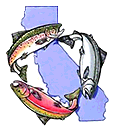Taking the Pulse: Measuring Restoration Success
April 29 - May 2, 2025
Landscape-Scale Process Based Restoration for Forests, Floodplains and Fish
02 May 2025
9:00am - 12:15pm
Session Coordinators: Carrie Monohan, Mooretown Rancheria of Maidu Indians; Ben Cook, Trout Unlimited; and Karen Pope, Pacific Southwest Research Station USDA
Process Based Restoration (PBR) engages dynamic ecological processes and removes constraints to those processes to encourage ecosystems to thrive and recover from disturbance. The theory and application of PBR continues to evolve and grow from site-level to landscape-scale partnerships ready to tackle increasingly intense and variable disturbance regimes. As PBR seeks to work at effective spatial and temporal scales, the PBR community realizes the need to exchange information and collaborate with a broad contingent with expertise at implementing multi-generational ecological and cultural stewardship models at broad spatial scales. New, increasingly variable disturbance regimes require expansive multi-disciplinary and multi-generational collaborations to work at spatial and temporal watershed scales including: innovative techniques for working with onsite materials in low- and high-energy stream reaches to restore resilient hydrologic regimes; practices for working within forests and other upland areas such as beneficial fire; data fluencies and improved prioritization strategies for realizing multiple and multiplying benefits; and integrated scientific approaches for monitoring multivariate long-term responses to both disturbance and restoration. This session invites real-world examples of collaborations employing these toolsets to work across broad spatial and temporal scales to promote ecological uplift and resilience.
Cross-Organizational Collaboration for Watershed Scale Stream Restoration, Sara Sternberg M.S, Santa Cruz County, RCD
Characterizing Watershed Stream Network Geomorphic Conditions in Industrially Logged Watersheds and Developing Strategies for Using Process-Based Techniques to Restore Aquatic Habitat, Thomas H. Leroy, Engineering Geologist, Pacific Watershed Associates
Creating Community Stewardship, Garrett Costello, Owner, Symbiotic Restoration Group
Bringing Prescribed Burn Associations (PBAs) into Process Based Restoration (PBR): Restoring Fire with Prescribed Burn Associations, Lenya Quinn-Davidson, Fire Network Director, University of California Agriculture and Natural Resources
Structural Characteristics of Beaver Complexes and Implications for Beaver-Based Restoration, Caroline Gengo, UC Davis Center for Watershed Sciences
A Framework for Using Post-Fire Sediment to Restore Incised Channels, Zan Rubin, Ph.D., Balance Hydrologics
Data Fluency in Support of Inclusive Process-Based Restoration, Maureen (Mo) Johnson León, Doctoral Candidate in Data Science, University of Canterbury
Data Fluency in Support of Inclusive Process-Based Restoration, Maureen (Mo) Johnson León, Doctoral Candidate in Data Science, University of Canterbury


